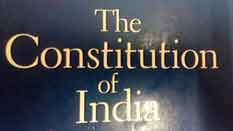Electoral Bonds: A Step Towards Political Transparency?
Electoral financing stands as a cornerstone of democratic governance, serving
as the lifeblood that fuels political campaigns, party activities, and policy
advocacy. In democracies worldwide, the transparency and integrity of this
funding process have been subjects of rigorous scrutiny and reform. India, as
the world's largest democracy, has not been an exception to this rule. With a
diverse and complex political landscape, the country has grappled with the
challenge of ensuring that political funding is transparent, accountable, and
free from undue influence.
In this context, the Indian government's introduction of electoral bonds in 2017 was seen as a bold initiative aimed at overhauling the traditional system of political donations. The concept promised to revolutionize political financing by offering a structured and formalized mechanism for contributions, all the while ensuring the privacy and security of donors. However, this seemingly progressive move was not without its share of controversies and debates. While some hailed electoral bonds as a transformative step towards transparency, others viewed them with suspicion, questioning whether they were truly a vehicle for political reform or merely a facade that concealed undisclosed donations.
This essay seeks to delve into the concept of electoral bonds, examining its merits and shortcomings, and evaluating its impact on political transparency in India. We will explore the arguments put forth by both proponents and critics of electoral bonds, and critically analyze the Supreme Court's landmark ruling that declared the electoral bonds system unconstitutional. Through this exploration, we aim to answer the pivotal question: Are electoral bonds indeed a step towards political transparency, or do they obscure the very transparency they purport to uphold?
The Concept of Electoral Bonds
Electoral bonds were introduced in India in 2017 with the aim of reforming the system of political funding and making it more transparent and accountable. At its core, an electoral bond is an interest-free bearer bond that facilitates political donations in a structured and formalized manner. The idea was to provide a legal and transparent channel for individuals and corporate entities to contribute to political parties without the fear of repercussions or victimization.
How Electoral Bonds Work
Electoral bonds are issued by the State Bank of India (SBI) in specified denominations, ranging from as low as Rs. 1,000 to as high as Rs. 1 crore or more. These bonds can be purchased by any citizen of India or corporate entity incorporated in India. Unlike traditional methods of political donations, which often involve cash transactions or bank transfers, electoral bonds offer a more streamlined and transparent process.
Once purchased, these bonds are akin to promissory notes, bearing no name or other identifying details of the donor. The donor can then donate these bonds to any eligible political party of their choice within 15 days from the date of purchase. The bonds can only be encashed by the recipient political party through a designated bank account with the authorized bank within the stipulated period.
Anonymity and Privacy
One of the key features of electoral bonds, and perhaps its most controversial aspect, is the anonymity it provides to donors. Unlike traditional methods where donors' details must be disclosed, electoral bonds allow donors to remain anonymous. This anonymity was introduced with the intention of protecting donors from potential victimization or political backlash for their contributions.
Transparency Measures
While the anonymity of donors has been a point of contention, proponents of electoral bonds argue that the system incorporates several transparency measures. For instance, the bonds can only be purchased through recognized banking channels, ensuring that the money trail is legitimate and traceable. Moreover, political parties are required to disclose the amount of electoral bonds they receive in their annual audited accounts.
Security Features
To prevent counterfeiting and ensure the integrity of the electoral bond system, the bonds come with several security features. These include unique serial numbers, invisible ink, and other features that make them difficult to duplicate.
Criticism and Controversies
Despite its intended benefits, the concept of electoral bonds has been mired in controversy since its inception. Critics argue that the anonymity afforded by electoral bonds undermines transparency and accountability in political funding. Without knowing the source of political donations, there is a risk of quid pro quo arrangements, where donors may expect favors from political parties in return for their contributions.
Furthermore, concerns have been raised about the potential for foreign entities to influence Indian politics through electoral bonds. Since there are no restrictions on who can purchase these bonds, there is a risk that foreign entities could funnel money into Indian political parties, thereby undermining the integrity of the democratic process.
Conclusion of the Concept
In summary, electoral bonds represent a novel attempt to reform political funding in India by providing a structured and formalized mechanism for donations. While the concept has its merits, including streamlined transactions and enhanced security features, it has also been the subject of considerable criticism and debate. The balance between donor anonymity and transparency remains a contentious issue, highlighting the need for further reforms and scrutiny to ensure that political funding in India is conducted in a manner that upholds the principles of transparency, accountability, and democratic integrity.
Critics' Concerns
The introduction of electoral bonds in India aimed to overhaul the traditional system of political donations and promote transparency in political funding. However, critics have raised several concerns regarding this new mechanism.
One of the primary concerns is the anonymity electoral bonds afford to donors. In traditional systems of political funding, transparency is maintained through mandatory disclosure of donors' details. This transparency allows for an understanding of potential conflicts of interest and influence over political decisions. Electoral bonds, by allowing donors to remain anonymous, break away from this transparency. Critics argue that this anonymity can lead to a lack of accountability, as political parties are not obligated to disclose the identity of their donors. This opacity can potentially pave the way for quid pro quo arrangements, where donors may expect political favors in return for their contributions, without the knowledge of the general public.
Another significant concern is the potential for foreign entities to influence Indian politics through electoral bonds. The absence of restrictions on who can purchase these bonds means that foreign corporations or governments could potentially funnel money into Indian political parties. This raises serious questions about the sovereignty and integrity of the democratic process. Foreign interference in domestic politics can skew policy decisions and compromise national interests, undermining the very essence of democratic governance.
Critics also argue that the electoral bond system can distort the level playing field in elections. Large corporate donors or wealthy individuals may have the financial capacity to purchase high-value bonds and make significant contributions to political parties. This can give them undue influence over political parties and candidates, drowning out the voices of smaller donors and grassroots movements. In a democracy, it is crucial that all voices are heard and that no single entity or group wields disproportionate influence over the political process.
From a legal standpoint, the lack of transparency and accountability in the electoral bond system raises several red flags. The system's anonymity provisions could potentially violate the principles of transparency and accountability enshrined in electoral laws and constitutional provisions. Moreover, the absence of stringent checks and balances could open the door for misuse and abuse of the system, leading to legal challenges and ethical dilemmas.
Lastly, the lack of transparency and the potential for misuse of electoral bonds can erode public trust in the political system. When citizens are unaware of who is funding political parties and candidates, it can lead to suspicions of corruption, favoritism, and backdoor deals. This erosion of trust can have long-term implications for the health of democracy, as an informed and engaged citizenry is essential for the functioning of a vibrant democratic system.
Supreme Court's Landmark Ruling
In a landmark ruling on February 15, the Supreme Court of India declared the electoral bonds system unconstitutional. A five-judge panel unanimously invalidated this high-value scheme, asserting that it infringed upon the right to information, thereby undermining freedom of speech and expression as guaranteed by Article 19(1)(a) of the Constitution.
The judgment affirmed a fundamental democratic principle: voters have the right to know who is financing political parties and their electoral campaigns. The court ordered an immediate halt to the sale of electoral bonds and overturned changes to the Income Tax Act and the Representation of People Act that had permitted anonymous donations.
The court's decision was a significant victory for transparency and accountability in Indian politics. It sent a clear message that the democratic process should not be undermined by undisclosed and anonymous political contributions.
Implications of the Supreme Court's Decision
The Supreme Court's decision to invalidate the electoral bonds system has far-reaching implications for political funding in India. First and foremost, it underscores the importance of transparency in electoral financing. Voters have a right to know who is funding political parties and candidates, as this information can influence their voting decisions and perceptions of political parties.
Secondly, the judgment highlights the need for legislative reforms to ensure that political funding is transparent and accountable. The court's criticism of amendments to the Income Tax Act and the Representation of People Act indicates that there is a need to revisit and revise these laws to prevent anonymous donations and ensure that political parties are held accountable for their funding sources.
Conclusion
In conclusion, the introduction of electoral bonds in India was a significant attempt to reform the system of political funding and bring about greater transparency in political donations. While the concept of electoral bonds aimed to streamline the donation process and protect donors from potential victimization, it has been met with considerable criticism and scrutiny.
The concerns raised by critics regarding the anonymity afforded to donors, the potential for foreign influence, the distortion of the level playing field in elections, and the legal and ethical implications of the system are valid and warrant serious consideration. These concerns underscore the need for a more comprehensive approach to political funding reform that balances the objectives of transparency, accountability, and privacy.
The Supreme Court's landmark ruling declaring the electoral bonds system unconstitutional further emphasizes the importance of addressing these concerns. The court's decision reaffirms the fundamental democratic principle that voters have the right to know who is financing political parties and their electoral campaigns. It sends a clear message that transparency in political funding is not just desirable but essential for the health of democracy.
Moving forward, policymakers, political parties, and civil society must come together to devise a robust and transparent mechanism for political funding that addresses the concerns raised by critics and upholds the principles of democracy. This may require revisiting the concept of electoral bonds, exploring alternative methods of political funding, or introducing stringent transparency and disclosure requirements.
Ultimately, the goal should be to strengthen India's democratic institutions and ensure that they remain robust, transparent, and accountable to the people they serve. By addressing the concerns surrounding electoral bonds and embracing a more transparent approach to political funding, India can pave the way for a healthier, more vibrant democracy where citizens can trust in the integrity of the political process.
Written By: Samridhi Sharma, Student at Chandigarh University
Author of the book : "Family Law: An Overview to Hindu Law"
Email: [email protected]
In this context, the Indian government's introduction of electoral bonds in 2017 was seen as a bold initiative aimed at overhauling the traditional system of political donations. The concept promised to revolutionize political financing by offering a structured and formalized mechanism for contributions, all the while ensuring the privacy and security of donors. However, this seemingly progressive move was not without its share of controversies and debates. While some hailed electoral bonds as a transformative step towards transparency, others viewed them with suspicion, questioning whether they were truly a vehicle for political reform or merely a facade that concealed undisclosed donations.
This essay seeks to delve into the concept of electoral bonds, examining its merits and shortcomings, and evaluating its impact on political transparency in India. We will explore the arguments put forth by both proponents and critics of electoral bonds, and critically analyze the Supreme Court's landmark ruling that declared the electoral bonds system unconstitutional. Through this exploration, we aim to answer the pivotal question: Are electoral bonds indeed a step towards political transparency, or do they obscure the very transparency they purport to uphold?
The Concept of Electoral Bonds
Electoral bonds were introduced in India in 2017 with the aim of reforming the system of political funding and making it more transparent and accountable. At its core, an electoral bond is an interest-free bearer bond that facilitates political donations in a structured and formalized manner. The idea was to provide a legal and transparent channel for individuals and corporate entities to contribute to political parties without the fear of repercussions or victimization.
How Electoral Bonds Work
Electoral bonds are issued by the State Bank of India (SBI) in specified denominations, ranging from as low as Rs. 1,000 to as high as Rs. 1 crore or more. These bonds can be purchased by any citizen of India or corporate entity incorporated in India. Unlike traditional methods of political donations, which often involve cash transactions or bank transfers, electoral bonds offer a more streamlined and transparent process.
Once purchased, these bonds are akin to promissory notes, bearing no name or other identifying details of the donor. The donor can then donate these bonds to any eligible political party of their choice within 15 days from the date of purchase. The bonds can only be encashed by the recipient political party through a designated bank account with the authorized bank within the stipulated period.
Anonymity and Privacy
One of the key features of electoral bonds, and perhaps its most controversial aspect, is the anonymity it provides to donors. Unlike traditional methods where donors' details must be disclosed, electoral bonds allow donors to remain anonymous. This anonymity was introduced with the intention of protecting donors from potential victimization or political backlash for their contributions.
Transparency Measures
While the anonymity of donors has been a point of contention, proponents of electoral bonds argue that the system incorporates several transparency measures. For instance, the bonds can only be purchased through recognized banking channels, ensuring that the money trail is legitimate and traceable. Moreover, political parties are required to disclose the amount of electoral bonds they receive in their annual audited accounts.
Security Features
To prevent counterfeiting and ensure the integrity of the electoral bond system, the bonds come with several security features. These include unique serial numbers, invisible ink, and other features that make them difficult to duplicate.
Criticism and Controversies
Despite its intended benefits, the concept of electoral bonds has been mired in controversy since its inception. Critics argue that the anonymity afforded by electoral bonds undermines transparency and accountability in political funding. Without knowing the source of political donations, there is a risk of quid pro quo arrangements, where donors may expect favors from political parties in return for their contributions.
Furthermore, concerns have been raised about the potential for foreign entities to influence Indian politics through electoral bonds. Since there are no restrictions on who can purchase these bonds, there is a risk that foreign entities could funnel money into Indian political parties, thereby undermining the integrity of the democratic process.
Conclusion of the Concept
In summary, electoral bonds represent a novel attempt to reform political funding in India by providing a structured and formalized mechanism for donations. While the concept has its merits, including streamlined transactions and enhanced security features, it has also been the subject of considerable criticism and debate. The balance between donor anonymity and transparency remains a contentious issue, highlighting the need for further reforms and scrutiny to ensure that political funding in India is conducted in a manner that upholds the principles of transparency, accountability, and democratic integrity.
Critics' Concerns
The introduction of electoral bonds in India aimed to overhaul the traditional system of political donations and promote transparency in political funding. However, critics have raised several concerns regarding this new mechanism.
One of the primary concerns is the anonymity electoral bonds afford to donors. In traditional systems of political funding, transparency is maintained through mandatory disclosure of donors' details. This transparency allows for an understanding of potential conflicts of interest and influence over political decisions. Electoral bonds, by allowing donors to remain anonymous, break away from this transparency. Critics argue that this anonymity can lead to a lack of accountability, as political parties are not obligated to disclose the identity of their donors. This opacity can potentially pave the way for quid pro quo arrangements, where donors may expect political favors in return for their contributions, without the knowledge of the general public.
Another significant concern is the potential for foreign entities to influence Indian politics through electoral bonds. The absence of restrictions on who can purchase these bonds means that foreign corporations or governments could potentially funnel money into Indian political parties. This raises serious questions about the sovereignty and integrity of the democratic process. Foreign interference in domestic politics can skew policy decisions and compromise national interests, undermining the very essence of democratic governance.
Critics also argue that the electoral bond system can distort the level playing field in elections. Large corporate donors or wealthy individuals may have the financial capacity to purchase high-value bonds and make significant contributions to political parties. This can give them undue influence over political parties and candidates, drowning out the voices of smaller donors and grassroots movements. In a democracy, it is crucial that all voices are heard and that no single entity or group wields disproportionate influence over the political process.
From a legal standpoint, the lack of transparency and accountability in the electoral bond system raises several red flags. The system's anonymity provisions could potentially violate the principles of transparency and accountability enshrined in electoral laws and constitutional provisions. Moreover, the absence of stringent checks and balances could open the door for misuse and abuse of the system, leading to legal challenges and ethical dilemmas.
Lastly, the lack of transparency and the potential for misuse of electoral bonds can erode public trust in the political system. When citizens are unaware of who is funding political parties and candidates, it can lead to suspicions of corruption, favoritism, and backdoor deals. This erosion of trust can have long-term implications for the health of democracy, as an informed and engaged citizenry is essential for the functioning of a vibrant democratic system.
Supreme Court's Landmark Ruling
In a landmark ruling on February 15, the Supreme Court of India declared the electoral bonds system unconstitutional. A five-judge panel unanimously invalidated this high-value scheme, asserting that it infringed upon the right to information, thereby undermining freedom of speech and expression as guaranteed by Article 19(1)(a) of the Constitution.
The judgment affirmed a fundamental democratic principle: voters have the right to know who is financing political parties and their electoral campaigns. The court ordered an immediate halt to the sale of electoral bonds and overturned changes to the Income Tax Act and the Representation of People Act that had permitted anonymous donations.
The court's decision was a significant victory for transparency and accountability in Indian politics. It sent a clear message that the democratic process should not be undermined by undisclosed and anonymous political contributions.
Implications of the Supreme Court's Decision
The Supreme Court's decision to invalidate the electoral bonds system has far-reaching implications for political funding in India. First and foremost, it underscores the importance of transparency in electoral financing. Voters have a right to know who is funding political parties and candidates, as this information can influence their voting decisions and perceptions of political parties.
Secondly, the judgment highlights the need for legislative reforms to ensure that political funding is transparent and accountable. The court's criticism of amendments to the Income Tax Act and the Representation of People Act indicates that there is a need to revisit and revise these laws to prevent anonymous donations and ensure that political parties are held accountable for their funding sources.
Conclusion
In conclusion, the introduction of electoral bonds in India was a significant attempt to reform the system of political funding and bring about greater transparency in political donations. While the concept of electoral bonds aimed to streamline the donation process and protect donors from potential victimization, it has been met with considerable criticism and scrutiny.
The concerns raised by critics regarding the anonymity afforded to donors, the potential for foreign influence, the distortion of the level playing field in elections, and the legal and ethical implications of the system are valid and warrant serious consideration. These concerns underscore the need for a more comprehensive approach to political funding reform that balances the objectives of transparency, accountability, and privacy.
The Supreme Court's landmark ruling declaring the electoral bonds system unconstitutional further emphasizes the importance of addressing these concerns. The court's decision reaffirms the fundamental democratic principle that voters have the right to know who is financing political parties and their electoral campaigns. It sends a clear message that transparency in political funding is not just desirable but essential for the health of democracy.
Moving forward, policymakers, political parties, and civil society must come together to devise a robust and transparent mechanism for political funding that addresses the concerns raised by critics and upholds the principles of democracy. This may require revisiting the concept of electoral bonds, exploring alternative methods of political funding, or introducing stringent transparency and disclosure requirements.
Ultimately, the goal should be to strengthen India's democratic institutions and ensure that they remain robust, transparent, and accountable to the people they serve. By addressing the concerns surrounding electoral bonds and embracing a more transparent approach to political funding, India can pave the way for a healthier, more vibrant democracy where citizens can trust in the integrity of the political process.
Written By: Samridhi Sharma, Student at Chandigarh University
Author of the book : "Family Law: An Overview to Hindu Law"
Email: [email protected]
Law Article in India
Legal Question & Answers
Lawyers in India - Search By City
LawArticles
How To File For Mutual Divorce In Delhi

How To File For Mutual Divorce In Delhi Mutual Consent Divorce is the Simplest Way to Obtain a D...
Increased Age For Girls Marriage

It is hoped that the Prohibition of Child Marriage (Amendment) Bill, 2021, which intends to inc...
Facade of Social Media

One may very easily get absorbed in the lives of others as one scrolls through a Facebook news ...
Section 482 CrPc - Quashing Of FIR: Guid...

The Inherent power under Section 482 in The Code Of Criminal Procedure, 1973 (37th Chapter of t...
The Uniform Civil Code (UCC) in India: A...

The Uniform Civil Code (UCC) is a concept that proposes the unification of personal laws across...
Role Of Artificial Intelligence In Legal...

Artificial intelligence (AI) is revolutionizing various sectors of the economy, and the legal i...








Please Drop Your Comments